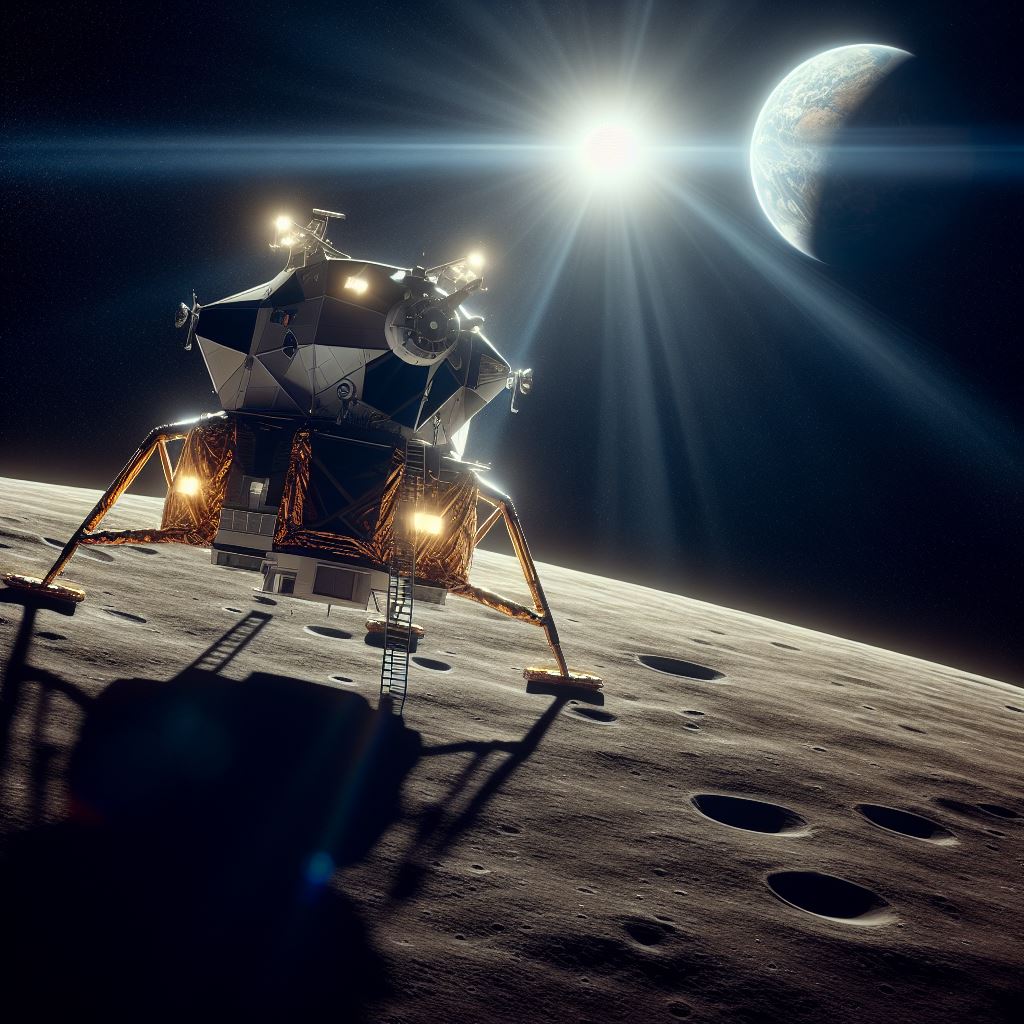Image generated by Bing Image Creator by Designer.
US company Intuitive Machines successfully landed its spacecraft named Odysseus on the moon on Thursday 22nd February. This mission, named IM-1, marks the first time in history that a private company has landed a spacecraft on the moon. It has been over 50 years since a United States vessel landed on the Moon. The last US mission was Apollo 17 in 1972, three years after humans first stepped onto the Moon.
With this lack of state-led projects in mind, this article will argue that cooperation between the public and private sectors is essential if we are to make the most of the space exploration.
What is IM-1?
Odysseus, the name of the Intuitive Machines craft, delivered a range of scientific equipment to the moon, including a payload from NASA. The NASA equipment delivered by the spacecraft will help to better understand planetary evolution, search for water on the Moon, and support human exploration in the long-term. Odysseus also carried a sculpture by artist Jeff Koons. The sculpture consists of a box with 125 miniature sculptures of the moon going through its phases. Each inscribed with the name of a famous or influential person from human history, such as Aristotle and Billie Holiday.
An International Project
Intuitive Machines did not complete the Odysseus landing alone. Their lander was propelled into space by a Space X Falcon 9 rocket and NASA contributed $118 million (approximately £93 million) of funding. Commercial Lunar Payload Services (CLPS) is the NASA scheme that paid Intuitive Machines to deliver NASA equipment to the moon. Under the scheme, companies bid for indefinite delivery and quantity contracts from NASA with a maximum cumulative value of $2.6 billion (approximately £2 billion).
The expansion of the Enterprise Zones project and creation of similar schemes, both for scientific pursuits and other sectors, can nurture an innovative and impactful enterprise culture in this country.
Odysseus’ journey was not solely a US endeavour. The Goonhilly Earth Station, a facility in Cornwall in the UK, also played an instrumental role in the Odysseus mission. Goonhilly, a privately owned company, established the world’s first deep space communications network and provides satellite communications services from earth’s orbit and beyond. The company was founded in one of the UK’s Enterprise Zones. Enterprise Zones offer either a 100% business rate discount worth up to £275,000 per business over 5 years or 100% enhanced capital allowances (tax relief) to businesses making large investments in plant and machinery in certain zones.
Goonhilly’s participation in the Intuitive Machines mission is an example of the leading position Britain can play in humanity’s scientific development. It is similar to the JET nuclear fusion programme, discussed in one of our previous articles. It is also a case study of the success that can come from government intervention. The expansion of the Enterprise Zones project and creation of similar schemes, both for scientific pursuits and other sectors, can nurture an innovative and impactful enterprise culture in this country.
Odysseus’ Odyssey
Odysseus’ journey was not without complications. Intuitive Machines’ laser navigation system failed only hours before Odysseus was set to land, with an experimental system created by NASA used instead. This system was not supposed to be used on this mission. In addition, the lander fell over on touchdown and is now lying on its side. This follows an unsuccessful mission by Astrobotic, whose moon lander failed to reach its destination and disintegrated whilst re-entering earth’s atmosphere following issues with its fuel tank.
The issues faced in the Intuitive Machines project and the failure of that by Astrobotic go to show that there is a lot of work to be done before space becomes a reliable industry. If it is not reliable, it is not profitable. The Intuitive Machines missions only took place due to NASA funding, demonstrating that state intervention in the space exploration sector is vitally important for its future success. While it seems inevitable that space exploration will expand over the coming decades, it can only do so with a combined effort of the public and private sectors.
The Space Industry
The BBC has reported hopes that the Intuitive Machines mission will ‘plant the seeds of a wider, thriving lunar economy’. They say that the future of private endeavours in space could include the provision of services like transport, communication, and power. This unprecedented feat in human history is indeed impressive. However, nearly half of the missions funding came from the public purse. The same BBC article quotes Neil deGrasse Tyson as saying that more public investment is necessary before private companies will seriously look at space as a good investment. He is right, as space remains a difficult and unconquered frontier. This makes it a hard sell for investors.
The expansion of scientific experiments conducted in space and on other planets could bring revolutionary benefits.
Repeated investment in space exploration is a significant expense that the taxpayer will have to pay if humanity is going to have a future in space. Schemes like the UK’s Enterprise Zones should be expanded to further benefit sectors that are at the forefront of scientific development. In the long term, space exploration can solve many of humanity’s problems.
Many necessary resources that are scarce on earth are plentiful in space, and the possibility of lunar or Martian settlements is tantalizing, especially if the human population of Earth grows to an unsustainable size. Scientific discovery in its own right is an important benefit of human expansion into space. The expansion of scientific experiments conducted in space and on other planets could bring revolutionary benefits.
Final Thoughts
Until these opportunities are easier to exploit for profit, private companies cannot solely provide the solution to the unsolved problems that stand in the way of human’s future in space. Incentives and investment by the national governments and, where possible, international organizations, can speed up progress in the field of space exploration. The more that humans explore space, for whatever reason, the better at it they will become. This will make space a reliable and profitable investment. Over half a century after the last human set foot on the moon, this milestone in human space exploration set by Intuitive Machines serves as a reminder of the importance of public investment in space.



